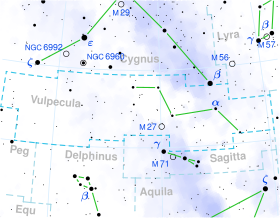Top Qs
Timeline
Chat
Perspective
23 Vulpeculae
Star in the constellation Vulpecula From Wikipedia, the free encyclopedia
Remove ads
23 Vulpeculae is a triple star system[12] in the northern constellation of Vulpecula. It is visible to the naked eye as a faint, orange-hued star with an apparent visual magnitude of 4.52[2] and it is located approximately 327 light years away from the Sun based on parallax.[1] The system is moving further from the Earth with a heliocentric radial velocity of +1.47 km/s.[4]
Component A forms a binary system with an orbital period of 25.33 years, an eccentricity of 0.40, and a semimajor axis of 0.11″.[6] The 4.80 magnitude member of this pair, component Aa is an aging giant star with a stellar classification of K3- III Fe-1,[3] where the suffix indicates an underabundance of iron in the spectrum. This star has 2.4[7] times the mass of the Sun and is radiating 288 times the Sun's luminosity from its enlarged photosphere at an effective temperature of 4,413 K.[8] Its companion, component Ab, has magnitude 6.5.[6] The tertiary member, component B, has a separation of 0.26" and a magnitude of 6.94.[7][13][12]
Remove ads
References
External links
Wikiwand - on
Seamless Wikipedia browsing. On steroids.
Remove ads

